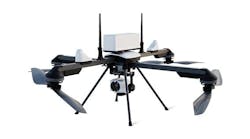As airline pilots ponder a future without a cockpit, flying a drone could be the next best thing.
Aquiline Drones, a Hartford business founded by a former airline pilot, will next month begin course work called “Flight to the Future,” a program offering courses supported by an online curriculum and business formation ideas.
Students will have access to cloud-connected commercial drone services marketed to anyone older than 18 with a “desire to take on a new career in a short period of time,” said Barry Alexander, founder and chief executive officer of Aquiline Drones.
Following the course, which averages six weeks, students can operate drones available on demand through an app he likens to Uber. Pilots who already know federal aviation rules and aerodynamics could have a head start.
The cost is of the program is less than $1,000, and Aquiline Drones says it takes a small percentage of job payments.
It’s a new approach to marketing drones, which are increasingly common at construction sites, in the real estate industry, for security, deliveries, law enforcement and other purposes. With many planes in commercial airline fleets grounded due to the coronavirus, thousands of pilots are out of work or fearful they soon will be.
“The pandemic is helping us with the Flight to the Future program,” said Alexander, whose background includes work as an aviator, aircraft mechanic, pilot and flight instructor.
Hiring of pilots by major passenger airlines collapsed in the spring and early summer, said Louis Smith, president of Future & Active Pilot Advisors, a career and financial advisory service to pilots. Major passenger and cargo airlines hired 4,977 pilots in 2019. The number plunged to 1,955 from January through July 2020, according to FAPA.
“They’ve had pilots go on strike, mechanics go on strike, but never passengers,” Smith said. “This is a whole new ballgame.”
A possible bright spot is that in the next 15 years, 41,000 pilots are expected to reach the mandatory retirement age of 65, which could spur hiring, he said.
Airlines received $32 billion in federal payroll help in the $2.2 trillion CARES Act in March. The assistance prohibits job cuts through Sept. 30, prompting worries in the industry that without another round of funding, job cuts will follow.
John Dunn, an air cargo pilot based in Cleveland, said the drone program lays the groundwork for starting a business.
“I’m not the entrepreneurial type,” he said. “It’s probably something I wouldn’t do on my own, to start a company out of the blue.”
Because Dunn flies for a cargo operator, he said he’s not affected “too much” by the decline of passenger travel. He’d still be able to keep his job, while operating a drone “as little or as much as I want on my days off.”
Piloting experience isn’t necessary for the course, but it helps, he said.
“If you’re a pilot, it’s a given. You understand,” Dunn said.
Ann Ryan, who’s been in aviation 20 years, said she’ll take the Aquiline Drones courses, because “it’s still flying” even if it’s not a plane.
“Once you’re out of a job, what do you do?” said Ryan, of Del Ray Beach, Fla. “Flying a drone is not the same, but it’s keeping me in the air, so to speak.”
Stephen Singer can be reached at [email protected].
———
©2020 The Hartford Courant (Hartford, Conn.)
Visit The Hartford Courant (Hartford, Conn.) at www.courant.com
Distributed by Tribune Content Agency, LLC.

